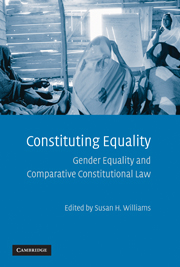Book contents
- Frontmatter
- Contents
- List of Contributors
- Acknowledgments
- CONSTITUTING EQUALITY
- Introduction: Comparative Constitutional Law, Gender Equality, and Constitutional Design
- SECTION ONE STRUCTURE
- SECTION TWO RIGHTS
- SECTION THREE CULTURE/RELIGION AND GENDER EQUALITY
- 6 Must Feminists Support Entrenchment of Sex Equality? Lessons from Quebec
- 7 Deconstructing the East/West Binary: Substantive Equality and Islamic Marriage in a Comparative Dialogue
- 8 Conflicting Agendas? Women's Rights and Customary Law in African Constitutional Reform
- 9 Gender Equality and the Rule of Law in Liberia: Statutory Law, Customary Law, and the Status of Women
- SECTION FOUR CONSTITUTIONS AND INTERNATIONAL LAW
- SECTION FIVE WOMEN IN THE PROCESS OF CONSTITUTION MAKING
- Conclusion: Gender Equality and the Idea of a Constitution: Entrenchment, Jurisdiction, and Interpretation
- Index
9 - Gender Equality and the Rule of Law in Liberia: Statutory Law, Customary Law, and the Status of Women
Published online by Cambridge University Press: 26 October 2009
- Frontmatter
- Contents
- List of Contributors
- Acknowledgments
- CONSTITUTING EQUALITY
- Introduction: Comparative Constitutional Law, Gender Equality, and Constitutional Design
- SECTION ONE STRUCTURE
- SECTION TWO RIGHTS
- SECTION THREE CULTURE/RELIGION AND GENDER EQUALITY
- 6 Must Feminists Support Entrenchment of Sex Equality? Lessons from Quebec
- 7 Deconstructing the East/West Binary: Substantive Equality and Islamic Marriage in a Comparative Dialogue
- 8 Conflicting Agendas? Women's Rights and Customary Law in African Constitutional Reform
- 9 Gender Equality and the Rule of Law in Liberia: Statutory Law, Customary Law, and the Status of Women
- SECTION FOUR CONSTITUTIONS AND INTERNATIONAL LAW
- SECTION FIVE WOMEN IN THE PROCESS OF CONSTITUTION MAKING
- Conclusion: Gender Equality and the Idea of a Constitution: Entrenchment, Jurisdiction, and Interpretation
- Index
Summary
INTRODUCTION
Women have suffered a wide range of discriminatory practices and abuses that have given rise to the global concern about the gross inequality and inequity existing between the genders. Gender inequality is indeed a global phenomenon, and the need to address this inequality has become urgent and compelling. Women all over the world have been deprived in one way or another of their rights to education, reproductive health, property, employment, economic opportunities, and most importantly, their rights to participate in the making of laws that directly affect them. These inequalities have subjected women to the whims of the male gender and have resulted in a huge disparity between the genders with respect to illiteracy and poverty. It has been reported that an estimated 60 to 80 percent of teenage girls in Liberia sell their bodies to fund their educations. Women's impoverishment and lack of education, in turn, contribute to their lower status in terms of health, property and economic development, employment, and politics. Thus, a circle is formed in which inequality breeds more inequality.
Gender inequality is not, however, limited to inequalities between the male and female genders. Intra-gender inequalities are also very significant issues that exacerbate the inequality of women by leaving some women in a particularly disadvantaged position. Laws sometimes draw distinctions between different groups of women, as was evident in the Liberian laws that classified and categorized women in Liberia into two groups, “civilized,” referring to urban and/or statutorily married women, and “native,” referring to rural and/or customarily married women.
- Type
- Chapter
- Information
- Constituting EqualityGender Equality and Comparative Constitutional Law, pp. 195 - 212Publisher: Cambridge University PressPrint publication year: 2009
- 1
- Cited by



